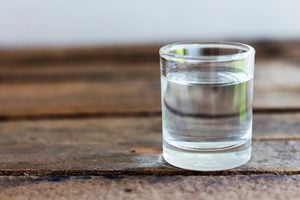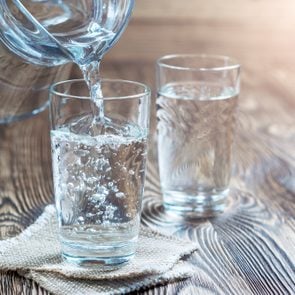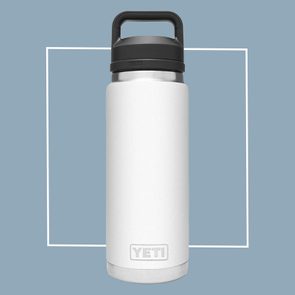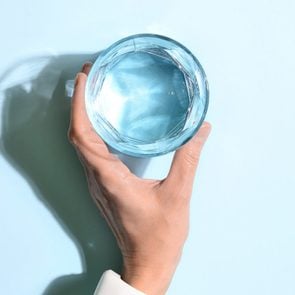Is It Bad to Drink Water That’s Been Sitting Overnight—Or Longer?
Updated: Jul. 21, 2023
We've all gulped down water leftover from last night—on the night table, on the counter, in the car—but is drinking stale water really safe?
Since your body gets dehydrated overnight, it’s not uncommon to wake up thirsty. But whether or not you should sip from the glass you left on the nightstand (was it last night—or the night before?) is up for debate.
What can get in the open glass?
You probably know that drinking water left in an open glass is not super sanitary. Dust, debris, and even the odd passing mosquito can drop into the glass overnight, leaving an unhealthy surface scum. Even a closed container like a bottle or pitcher introduces problems, mainly because our skin is coated with sweat, dust, skin cells, and even nasal discharge. Once we put the bottle in our mouth, these can all “backwash” into the remaining water, causing contamination.
Our saliva also carries bacteria, which does the same. “If it’s allowed to incubate for hours, that could potentially contaminate the water, and make you ill by reintroducing that bacteria,” says Marc Leavey, MD, primary care specialist at Mercy Medical Center in Massachusetts. “Once you have put your lips to the bottle, you should consume that bottle in one sitting and then discard it.”
 Could you get sick from drinking a glass of water that has been sitting overnight?
Could you get sick from drinking a glass of water that has been sitting overnight?
But let’s get real: Since it’s your own bacteria, it’s unlikely that you’ll actually get sick. Though no one brags about it, many people sip from used drinking glasses, mugs, and bottles without any ill effects. But it’s certainly not advisable to share your bottle with someone else. Neither should someone with a reduced immune system, such as transplant patients, those undergoing chemotherapy, or people living with HIV/AIDS, be exposed to contaminated water.
And it makes no difference whether it’s bottled or tap water. It’s a common myth that bottled water is cleaner than tap. Both have to meet exacting hygiene standards, according to the Environmental Protection Agency. And up to 25 percent of bottled water is drawn from the main water supply anyway, per the Natural Resources Defense Council.
Where else should you be cautious of leaving water for long periods of time?
So what about leaving water in places like your car? Water left in the sun will heat up, making it the perfect breeding ground for bacteria, especially if you’ve already drunk from it. Placing the bottle under your seat may reduce the heat a little, but bacteria will still grow. (Here’s why you shouldn’t refill your plastic water bottle.)
Some kinds of plastic bottles contain BPA or similar chemicals, that may leach into the water, especially after exposure to sunlight. There is research suggesting that BPA is linked to a wide range of health problems affecting the brain and behavior. Using a BPA-free bottle would eliminate this issue, but not the growth of bacteria, especially if you’re using a metal bottle, which heats up quickly, encouraging the germs to multiply.
Of course, staying hydrated is good for our health, so it’s important to recognize the signs of dehydration. Dr. Leavey offers this advice to stay healthy: “Avoid putting your mouth to the bottle. Just pour it into a cup or pour it directly into your mouth.” To also keep yourself safe, don’t drink water that is past its expiration date. Next, check out the facts that will make you stop using plastic.




















